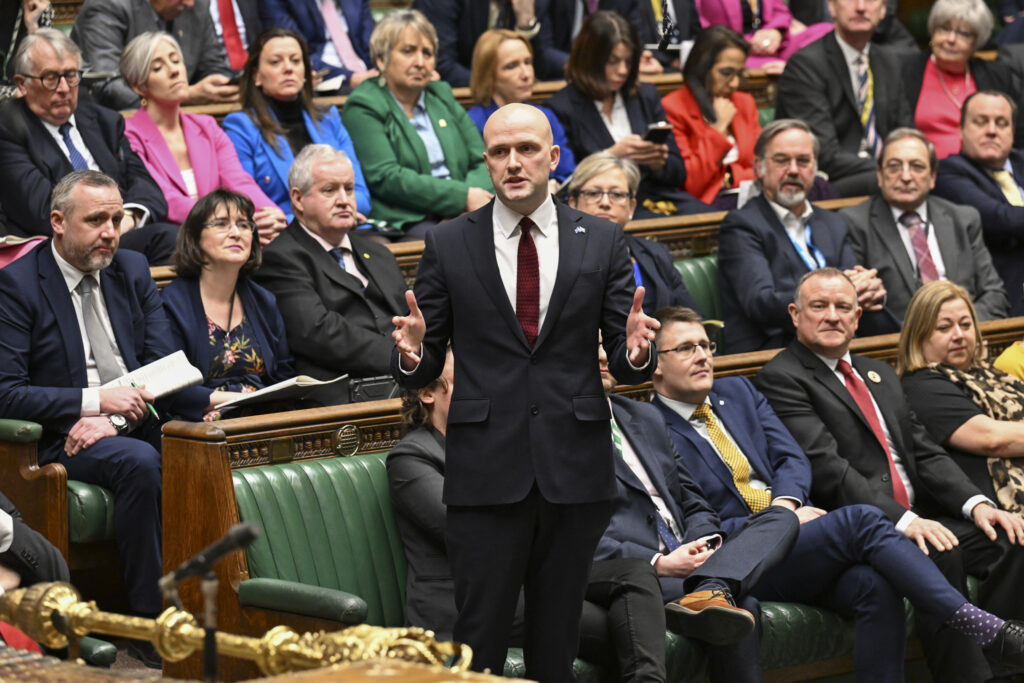What On Earth is Going On in the House of Commons? SNP Ceasefire Bill Chaos Explained
By Lilac Carr, BA Politics and International Relations
Humza Yousaf, leader of the SNP, stated that “Westminster is broken and people have a right to be angry”

Photo Caption – SNP Commons Leader Stephen Flynn debating in Parliament (Credit: UK Parliament/Maria Unger CC BY-NC-ND 2.0)
On Wednesday 21 February, Parliament descended into chaos in response to the Gaza ceasefire bill submitted by the SNP (Scottish National Party). The Speaker of the House of Commons, Lindsay Hoyle, has been met with an immense backlash after breaking parliamentary convention: allowing both Labour and Conservative amendments to the bill to be presented. This caused both SNP and Conservative Party MPs to walk out of the Commons and call for Hoyle’s resignation. The Labour amendment, calling for an “immediate humanitarian ceasefire,” was passed by Parliament following the walkouts.
The SNP put forward their bill on one of their opposition days, of which the SNP gets three per year and Labour gets 17. The bill called for an immediate ceasefire in Gaza, accused Israel of the crime of collective punishment, urged the suspension of arms sales to Israel, and called for tangible action to attain a ceasefire, likely including UN Security Council votes in favour of an immediate ceasefire. The UK so far has abstained from these votes.
The Labour Party put forth an amendment to the bill, aimed at quashing internal party division and rebellion over the vote. Their amendment called for an “immediate humanitarian ceasefire.” However, it removed accusations of collective punishment and tangible actions including the ending of arms sales. It also added criticism of Hamas, stating that their violence must end if Israel is to be expected to abide by a ceasefire.
The Conservative Party also put forth an amendment. This was likely aimed at preventing the Labour amendment from being heard, in turn preventing the passage of the SNP bill, as well as exposing internal divisions in the Labour Party. The Conservative amendment called for an “immediate humanitarian truce,” eventually leading to a “sustainable ceasefire” as opposed to an immediate ceasefire.
Over 80 MPs from the SNP and Conservative parties have signed letters of no confidence in Hoyle, and both the SNP and Tories have been extremely critical of the conduct of both Hoyle and Starmer. Humza Yousaf, leader of the SNP, stated that while he was “proud of the SNP” for bringing the bill to Parliament and “forcing Labour to change their position” toward supporting an immediate ceasefire, “Westminster is broken and many are right to be angry” about the chaos in parliament. Leader of the House of Commons, Tory MP Penny Mordaunt, stated that the “Speaker has…undermined the confidence of this house” by breaking away from standard procedure.
Some MPs have accused Starmer of threatening Hoyle’s position as Speaker under a future Labour government. Starmer has categorically denied this accusation, stating that he did not threaten but “simply urged” the Speaker to put forth his amendment. This has been seen by some as an attempt to prevent internal rebellion. During the failed SNP ceasefire bill vote in November, dozens of Labour MPs rebelled against the Labour whip, including several shadow ministers, forcing them to resign from their positions if they wish to vote for a ceasefire.
On 13 December, 153 countries voted in favour of an immediate ceasefire in the UN General Assembly. However, the UN Security Council has yet to call for a ceasefire. The UK voting for an immediate ceasefire is particularly significant given the UK’s role as one of five permanent members of the UN Security Council. However, whether the UK votes in favour of a ceasefire in future UN Security Council votes remains to be seen. The US has continued to veto UN Security Council ceasefire votes.
Even if the UK votes for a ceasefire, the impact may be limited: Israel has repeatedly rejected international demands for a ceasefire as well as other humanitarian demands. In addition, the Labour amendment passed does not entail ending arms sales to Israel or diplomatic relations with Israel, and as such the material effects of the amended ceasefire bill may be limited.




